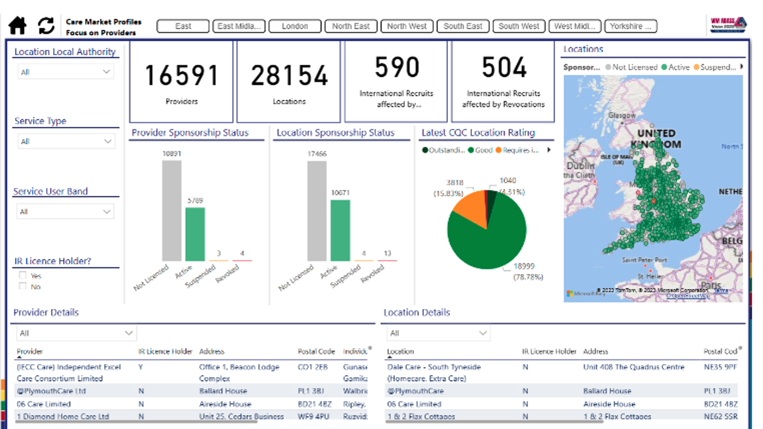International recruitment into adult social care has been identified by West Midlands ADASS, through its 2023 Future Thinking project, as an important factor in the resilience of the sector in the years ahead.
Local authorities commission adult social care mainly from independent providers, many of them with fewer than 250 employees.
In 2022 one third of these small and medium enterprise providers were considering exiting the adult social care market due to workforce issues and cost pressures, moves which would significantly impact increasing population needs for adult social care.
In February 2022, care workers were added to the Shortage Occupation List and the Health and Care worker visa route. This meant that providing workers met the salary thresholds and had a licensed sponsor, they could be recruited to care worker roles in the UK.
Since then, the evidence shows that care providers have been able to recruit care workers internationally to reduce vacancy rates.
There have however been some concerns about international recruitment in adult social care. Some providers have been put off by the administrative cost and burden, and there have been reported incidences of unethical recruitment and exploitation by recruiting agencies and providers.
West Midlands International Recruitment Programme
The International Recruitment Fund from DHSC has provided an opportunity for adult social care directors in the West Midlands to learn from other sectors to build a strong and resilient infrastructure around international recruitment to the adult social care workforce in our region.
Our December 2023 report Creating a sustainable adult social care workforce: international recruitment in West Midlands learning & evaluation which describes the project and its progress in much more detail, is available in the resources section.
Our programme activity focuses on:
- Applying national standards to establish positive recruitment and selection practices – with a focus on ethical recruitment practice.
- Establishing an HR Advisory and International Recruitment Hub to support care providers with international recruitment.
- Collaborating at regional and local levels with partners across the West Midlands, such as care associations, West Midlands Employers and Citizens Advice Bureau to share support and best practice.
- Distribution of small grants
Extending collaboration is one of the West Midlands ADASS building blocks for resilience in adult social care and has been a principle used within the International Recruitment Project.
We have made significant progress since the funding was awarded last year. With ten local grants now approved and the launch of the online West Midlands International Recruitment Hub and legal support line in January, we are actively supporting care providers and international recruits alike.
West Midlands Social Care International Recruitment Hub
Our partners WMEmployers have developed a new ethical recruitment service offer for CQC accredited adult care providers and councils operating in the West Midlands. It has five key components:
- Free legal and HR specialist support, including helplines and webinars
- 30-minutes of free legal advice for each care provider, until the end of June 2024
- A framework of ‘approved’ ethical recruitment managed service providers/agencies
- The IR Hub - a regional microsite

International recruitment dashboard
Our international recruitment dashboard has been developed to support local authorities and care providers with adherence to legislation, sponsorship regulation and ethical recruitment.

The aim is to increase awareness of the extent and spread of IR activity and provide a tool for contingency planning. It supports local authorities by providing:
- continuity of care considerations for any residents receiving care (either funded or self-funded) from any provider whose licence is revoked
- provider sustainability (particularly if IR is a major element of the provider's business model) and potential reduction in market capacity
- information about displaced sponsored workers and so that action to redeploy and support recruits in the event of revocation can be taken
- Loss of workforce capacity if “at risk” recruits cannot be redeployed within 60 days of notice of revocation.
A recent addition to the West Midlands Data Hub, this is available to local authority users on application to data@wm-adass.org.uk
